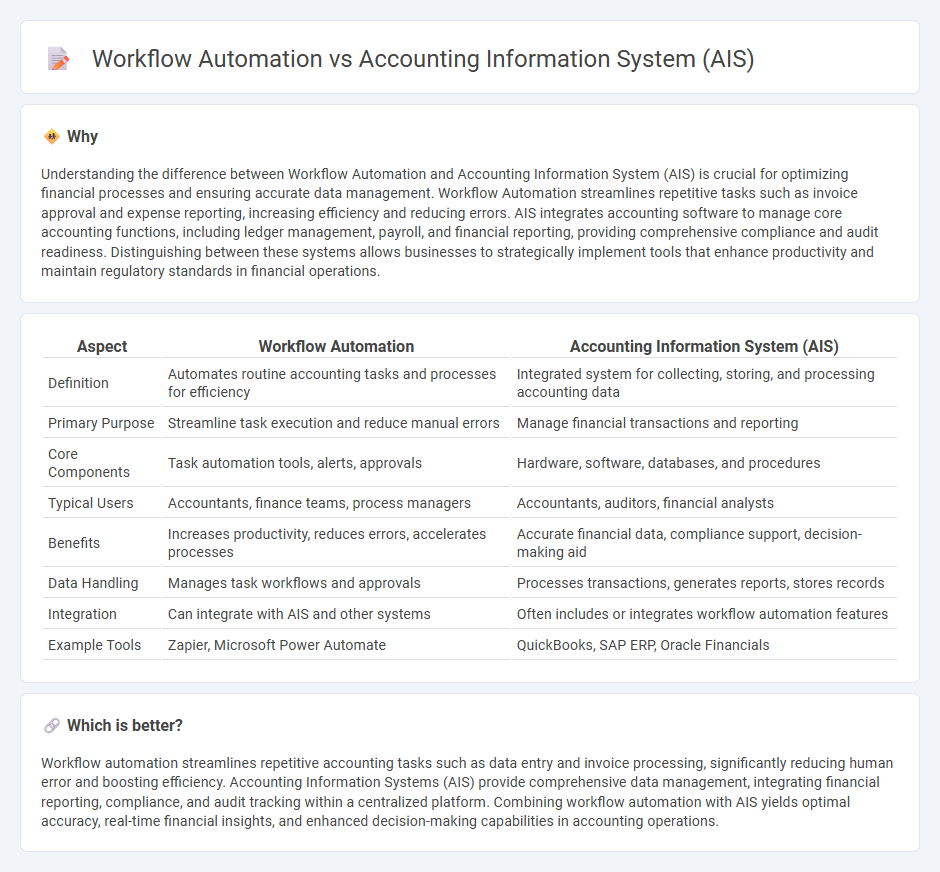
Workflow automation streamlines repetitive accounting tasks by utilizing software to manage processes such as invoice approvals, expense tracking, and financial reporting. Accounting Information Systems (AIS) integrate data collection, storage, and processing to support comprehensive financial management and decision-making. Discover how combining workflow automation with AIS can revolutionize your accounting efficiency and accuracy.
Why it is important
Understanding the difference between Workflow Automation and Accounting Information System (AIS) is crucial for optimizing financial processes and ensuring accurate data management. Workflow Automation streamlines repetitive tasks such as invoice approval and expense reporting, increasing efficiency and reducing errors. AIS integrates accounting software to manage core accounting functions, including ledger management, payroll, and financial reporting, providing comprehensive compliance and audit readiness. Distinguishing between these systems allows businesses to strategically implement tools that enhance productivity and maintain regulatory standards in financial operations.
Comparison Table
| Aspect | Workflow Automation | Accounting Information System (AIS) |
|---|---|---|
| Definition | Automates routine accounting tasks and processes for efficiency | Integrated system for collecting, storing, and processing accounting data |
| Primary Purpose | Streamline task execution and reduce manual errors | Manage financial transactions and reporting |
| Core Components | Task automation tools, alerts, approvals | Hardware, software, databases, and procedures |
| Typical Users | Accountants, finance teams, process managers | Accountants, auditors, financial analysts |
| Benefits | Increases productivity, reduces errors, accelerates processes | Accurate financial data, compliance support, decision-making aid |
| Data Handling | Manages task workflows and approvals | Processes transactions, generates reports, stores records |
| Integration | Can integrate with AIS and other systems | Often includes or integrates workflow automation features |
| Example Tools | Zapier, Microsoft Power Automate | QuickBooks, SAP ERP, Oracle Financials |
Which is better?
Workflow automation streamlines repetitive accounting tasks such as data entry and invoice processing, significantly reducing human error and boosting efficiency. Accounting Information Systems (AIS) provide comprehensive data management, integrating financial reporting, compliance, and audit tracking within a centralized platform. Combining workflow automation with AIS yields optimal accuracy, real-time financial insights, and enhanced decision-making capabilities in accounting operations.
Connection
Workflow automation integrates seamlessly with Accounting Information Systems (AIS) by streamlining data entry, processing, and reporting tasks to enhance accuracy and efficiency. AIS leverages automated workflows to reduce manual errors and accelerate financial transaction cycles, enabling real-time financial insights and compliance. The combination of workflow automation and AIS supports scalable accounting operations and improved decision-making through consistent data management and audit trails.
Key Terms
Data Integration
Accounting Information System (AIS) centralizes financial data by integrating various accounting functions such as payroll, accounts receivable, and general ledger, ensuring accurate and real-time financial reporting. Workflow automation enhances this by streamlining repetitive tasks and data transfer between systems, reducing errors and increasing efficiency across business processes. Explore how combining AIS with workflow automation revolutionizes data integration for superior financial management.
Internal Controls
Accounting Information Systems (AIS) integrate financial data processing with internal control mechanisms to ensure accuracy, compliance, and fraud prevention in accounting operations. Workflow automation streamlines business processes by automating routine tasks, which enhances efficiency but requires carefully designed internal controls to maintain data integrity and prevent unauthorized access. Explore how balancing AIS with workflow automation can strengthen internal controls and optimize financial management.
Process Efficiency
Accounting Information Systems (AIS) streamline financial data management by integrating transaction processing and reporting, enhancing accuracy and auditability, while workflow automation optimizes business process efficiency by automating repetitive tasks and ensuring smooth task transitions. AIS focuses on financial control and compliance, whereas workflow automation targets broader operational productivity and error reduction across departments. Explore how combining AIS with workflow automation can significantly boost your organization's process efficiency and financial accuracy.
Source and External Links
Accounting Information System (AIS): Definition, Benefits and Components - This page provides an overview of the definition, benefits, and components of an Accounting Information System (AIS), including its role in integrating traditional accounting practices with modern technology.
What is Accounting Information Systems - This webpage defines an AIS as a structured framework that businesses use to collect, process, and store financial and accounting data, facilitating decision-making and compliance.
Accounting Information System: What it Is and How it Works - This article explains how an AIS is used by companies to monitor finances, ensure data accuracy, and support decision-making, with a focus on its components and operational benefits.
 dowidth.com
dowidth.com